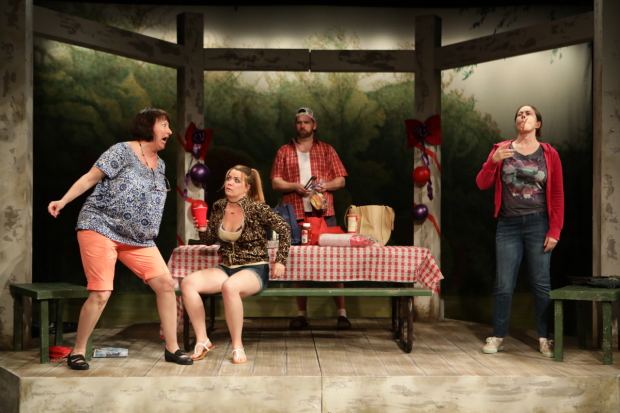Barbecue

(© Mark Howard)
Tolstoy did not know the O'Mallerys when he penned the oft-quoted lines, "Happy families are all alike, every unhappy family is unhappy in its own way." The O'Mallerys at the center of Robert O'Hara's pithy comedy Barbecue are presented twice, mouthing the same delusional and wounding dialogue, but differing in only one way. First we meet the white version; then the lights go out and come up again on the same characters, except they are black. And that's just Act 1.
Lillie Anne, the holier-than-thou sibling, has gathered two other sisters, the self-pitying Adlean and the hottie, Marie, along with their beer swilling, bro James T., around a grill in a public park. The location is hazy but might be south of the Mason-Dixon Line, judging by their heavy accents.
The barbecue is an excuse for Lillie Ann to bring the family together to confront their third sister, Barbara, nicknamed Zippety Boom for her behavior when she's high on drugs and alcohol, which is always. Lillie Anne instructs her siblings to come at Barbara firmly with whatever statements of love they can muster to stage an intervention — reality-TV style — so she will agree to enter a rehab program.
It becomes clear that all the siblings could do with a rehab program of their own. To say that the plan concocted for Barbara is incomplete and incoherent does not begin to describe its outcome, unreeled in Act 2, to a fantastic coda.
Under the spot-on direction of Summer L. Williams, the Lyric Stage production unfolds in hilarious form, at least during the set-up. The mood deepens in the second act when the two actors cast as Barbara meet and bond in a unique way.
Williams has cast the 10-actor ensemble perfectly, led by Deb Martin and Ramona Lisa Alexander in the dual roles of Barbara, with Bryan T. Donovan as a tell-it-as-it-is extrovert, matched in smart-aleck observations by James R. Milord, both as James T.
Adrianne Krstansky as Lillie Anne is an earnest do-gooder, stammering over her exhortations to her brother and sisters in her insistence on their help. Jasmine Rush makes the same character into an overbearing tyrant, ordering the others around.
Martin plays Barbara as a born-again Christian, without the overtones of religion. Her appearance and self-deprecating manner are a mask that disguises her intentions. Her facial expressions telegraph her true feelings even when her responses do not. Alexander as the "movie-star singer" is extravagant in gestures and put-on snobbery, the disguise she has taken to fool the world — and herself.
Jessica Pizzuti's design of a park in Anywhere, U.S.A., is purposely generic as if the action in Barbecue is universal, happening now and never-ending, while Tyler Kinney's costume designs nail each character's personality. Dialect coach Paul D'Agostino has done a stellar job teaching the actors the cadences of trash talk.
The humor, overwrought characters, and plot of Barbecue are just a cover for the playwright's concerns about many issues, chiefly the divide between who we really are and the illusions we build for ourselves. According to O'Hara, each of us has a real identity, but that is not the persona we present to society. And society is too quick to accept the lie. He also wonders who is telling the stories that rule our daily lives and why these stories differ for white folks and black folks, depending on who is doing the talking.











